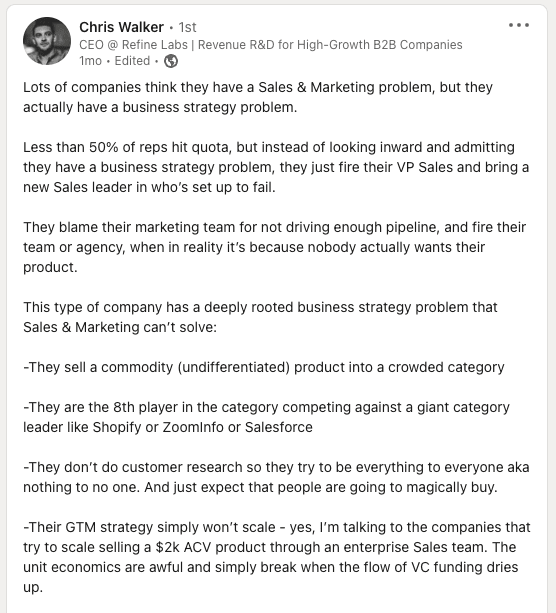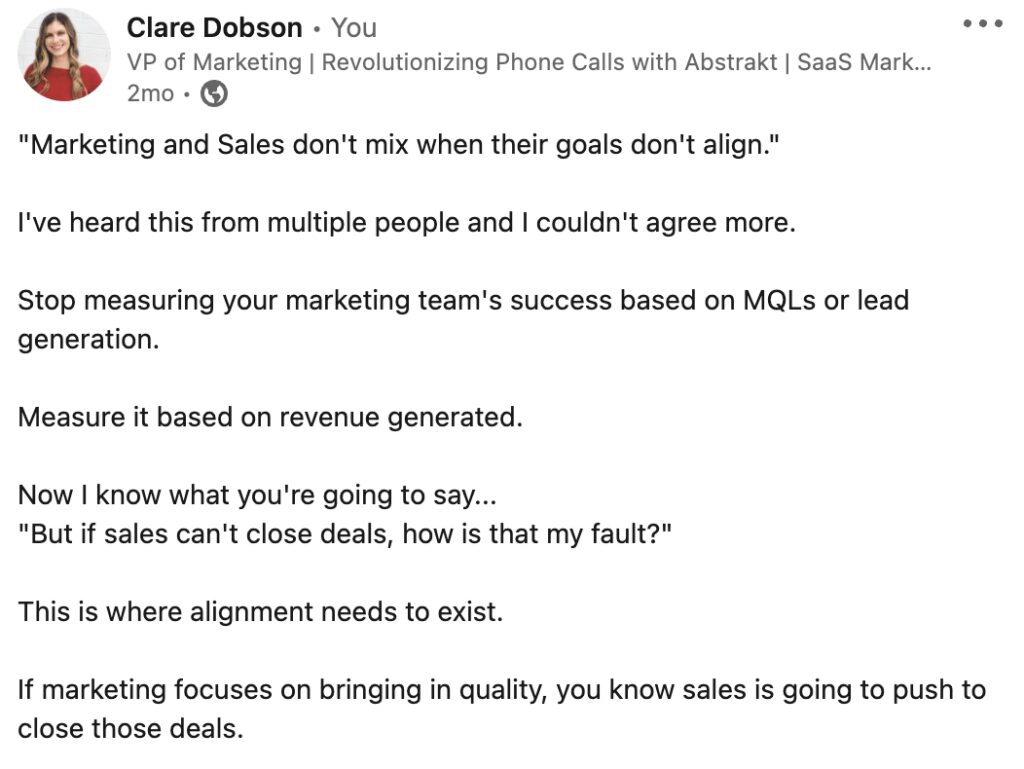Marketing and sales teams have more in common than you think. It goes beyond having the same goals, it’s all about the journey and what you learn along the way.
You might be asking yourself, how the heck do marketing teams learn from sales coaching? And why is that even important to how marketing and sales teams work together?
The short answer if you don’t want to read anything else on this post:
Listening to sales coaching and leadership guidance that the sales team receives can directly impact marketing and how/what you’re saying to prospects. And in a positive way!
If you’ve never listened to a sales call and reviewed the intelligence portion of what went well/didn’t go well, then you’re way behind so start there.
If you think that you’re way past that, then keep reading.
Let’s identify the problem with sales & marketing first
Instead of trying to rewrite what Chris Walker, CEO of Refine Labs, said, I’ll just share it.

Sales and marketing teams generally don’t get along.
Therefore if you’ve already been listening to sales calls, you’re ahead of the majority.
Sales blame marketing for terrible leads, marketing blames sales for not closing the leads. And it’s an ongoing cycle.
If your sales team doesn’t receive any sales coaching, there is another major hurdle that needs to be addressed.
If this sounds like you or your company, you’re not alone. Now more than ever, teams are struggling to unite as everyone is in it for themselves and trying not to get fired. But this is the exact reason why coaching can jumpstart the connection between the two teams.
Now that you’ve identified the problem your team is facing, let’s jump into the why.
Why sales coaching matters to marketing teams (and yes, sales teams)
If sales and marketing were to switch jobs for a week, how would that go?
If marketing believes that your target personas need to hear one thing, but sales is taking a different approach no wonder there are terrible leads and sales is not closing.
How do you go back to the basics without scraping everything you’ve put together? Invest in sales coaching software, require both teams to listen to sales calls, and then discuss what the major trends are.
- Objections
- Everyone in your company should understand why prospects are not buying your solution. Hands down. Then everyone should also understand how to respond when someone says “no”.
- If you’re in marketing and are saying no to this, I hate to tell you – you’re wrong.
- Hearing directly from prospects what they like/don’t like and why they don’t want to become a customer is legit ammo that you can use throughout your messaging.
- You’re handling the objection before they even have an opportunity to say it. This is marketing gold, all thanks to sales coaching software.
- Why do all “teams” have coaches?
- If every sports team has a coach, why shouldn’t sales and marketing teams? Everyone is trying to get better and when someone is guiding them and giving them pointers along the way, their results will skyrocket.
- But let’s be realistic. Maybe there is a team of 10 or 12 and you can’t expect one manager to meet with every sales rep each day? That’s where real-time sales coaching comes in, but we’ll touch on that later. Software is your friend when it comes to coaching so use it.
Here is how sales coaching has helped our teams
Here is a quick snapshot of the decisions we’ve made around sales coaching and why/how it’s played a pivotal role in our success. Hopefully, you can steal a couple of pieces from this and add them to your processes.
Step 1: Sales meet marketing. Marketing meet sales.
Step 2: Realign your goals. Both teams should be focused on revenue/sales. Of course, you’ll have other objectives along the way, but at the end of the day if it doesn’t lead to revenue it shouldn’t be a focus.

(Corporate teams are going crazy now if they’re reading this)
Step 3: Get sales coaching software. If you want to get serious and have your sales and marketing teams switch for a week, then real-time sales coaching software is exactly what you need to ensure your team isn’t losing opportunities during this phase.
Step 4: Set aside dedicated time each week to listen to calls. Or get software that can create a snapshot of everything and direct you to the exact times to listen on the calls (aka what Abstrakt does).
Step 5: Marketing teams meet separately and review their message vs. what prospects are saying. Identify the gaps, what aligns, and where quick improvements can be made.
Step 6: Rinse and repeat. This is an ongoing process. There is always more to learn, especially if you’re changing your ICP or pivoting, then listening to calls and utilizing sales coaching software should be a major piece of how you’re accomplishing that strategy.
In conclusion, sales and marketing teams can create efficient and effective revenue streams if they work together and learn from each other and their prospects. As soon as the blame game goes around, it’s time to step back and bring the teams together.
I promise it can make a bigger difference than you might think. I’ve been in both situations, where there is alignment and where there is not.
And when you start adding software, like real-time sales coaching software, it all flows even smoother.
Interested in learning more specifics about how our teams work together? Connect with me on LinkedIn and let’s chat.